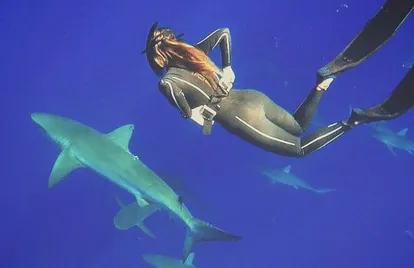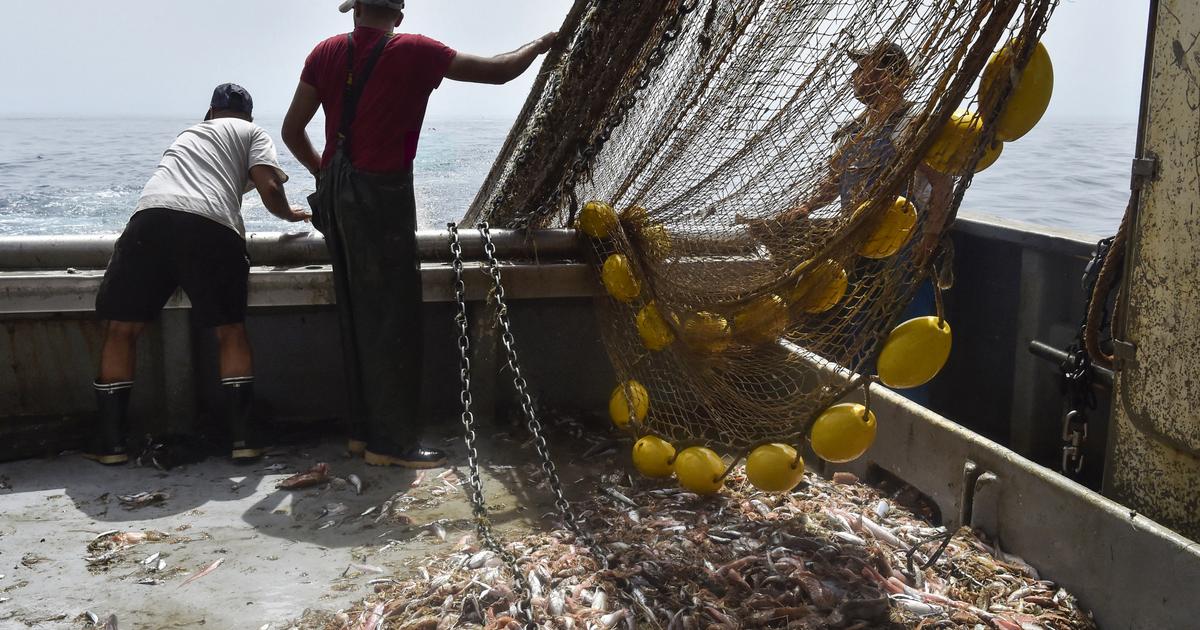Gádor Muntaner, an expert on sharks, makes you want to ask him about his scars, hoping that he will show them off like the oceanographer Hooper and Captain Quint in the famous scene from
Jaws
.
But it may only show a fine line over the bare collarbone and is not the product of a white, gray or mako shark attack.
"It's from a horse fall."
She has never been bitten by a shark, and it will not be because they have not had opportunities.
Muntaner (Barcelona, 30 years old), has been diving among sharks all over the world for a long time, to study them, since he met the first one in the Maldives at the age of 15.
He is passionate about them and fights for them.
The oceanographer, who left Pharmacy to study marine life and dive, has recently presented in Barcelona the National Geographic exhibition of photos by her colleague Brian Skerry (Movistar Centre, until July 30), dedicated to making the true nature known of sharks and raise awareness of the need for their preservation.
More information
The sharks reach the center of Barcelona, but they come with a good vibe
Ask.
You in
Jaws
identify with the bug, I imagine.
Response.
Yes!
(laughs) I love the movie!
The problem is that many people take it seriously, as something real, and that has created many unnecessary phobias and fears.
Humans aren't on the shark menu, and they know it.
Statistically there are very few attacks, and they are usually by mistake or trial, exploratory bites.
They haven't just eaten you.
They bite and let go when they see that it is not what they thought.
P.
That consoles little if it is you who are bitten.
R.
They do not go for us, at a gastronomic level they are not interested in anything.
Your silhouette may remind them of a seal in the water, but pinnipeds have a brutal amount of fat, they are very different.
We neither taste like shark prey nor smell like them.
Sharks are beings with highly developed senses and they know that we are not a marine species and that we are not on their menu.
P.
So, stories like the one about the sinking of the
Indianapolis
that Quint remembers, with hundreds of castaways in the water eaten by sharks...
R.
It is possible that they were already dead, drowned.
Many species of sharks are opportunistic scavengers.
When they find decomposing bodies they eat them.
Those sailors may have been postmortem prey.
Q.
There's that surfer girl who had her left arm ripped off by a tiger shark...
R.
Bethany Hamilton, yes, and now she's a big advocate for sharks.
It was clearly a mistaken attack.
They are very shocking accidents, but very unlikely.
Gádor Muntaner, diving among sharks.
Q.
Is the fear of sharks a product of the cinema?
R.
Let's see, it is natural that they provoke respect, they are powerful predators, but our aversion is also the product of what we have imagined, of our ignorance and misinformation.
It has always been a toxic relationship.
P.
Aspire to change it.
R.
Now the awareness that sharks are essential for the oceans is awakening.
There is a lot of talk that we have to be green, but also blue.
And preserving the seas requires taking care of sharks, wonderful creatures.
They should become as charismatic as dolphins and whales.
What scares me the most is swimming in a sea without them, from which they have disappeared.
P.
_
To be practical, suppose we come across a shark in the water, what should we do?
A.
Don't look like prey.
Q.
?
R.
Do not run away, fleeing is prey.
Maintain eye contact.
Keep an eye on the shark.
If you see it, you are in control of the situation.
Normally, once their curiosity is satisfied, they leave.
Q.
Okay, but what if it comes close?
R.
Sometimes they do, they even touch you with their nose, I have been touched by white and tiger sharks, but they have never attacked me.
If you respect them, they usually respect you.
P.
In that "usually" there is a world.
R.
Okay (laughs), they respect you.
If he comes towards you, you can go towards him, thus dislodging him.
hit him?
They say that in an attack you can try to hit him in the gills.
I've never had to;
if you have a camera you can push him a little with it and move him away from it.
Even with the bare hand.
Q.
You are not afraid of the sea.
R.
I have an unconditional love for him, since I was a child.
I feel safe in the sea.
Q.
Well, many people drown.
R.
It is usually due to ignorance of the medium.
And there are accidents, preventing them is essential: wear visibility devices, so someone always knows where you are, and don't panic.
Q.
Your worst moment in the water?
R.
When I was stung by a jellyfish, a Portuguese man-of-war.
It wrapped around my neck and stung between my fingers, which is a very sensitive area, trying to remove it.
She sent me to the hospital.
And it wasn't a shark!
50% off
Exclusive content for subscribers
read without limits
subscribe
I'm already a subscriber







